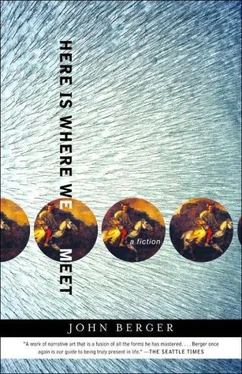Stop dropping names! she repeated and giggled. From here you could kill somebody dropping a name!
We gazed down at the red tiles and the double mattress in the window. The dog had stopped barking. And, when she stopped laughing, I held her cold hand.
Just write down what you find, she said.
I’ll never know what I’ve found.
No, you’ll never know.
It takes courage to write, I said.
The courage will come. Write down what you find, and do us the courtesy of noticing us.
You are no longer here!
Hence, the courtesy, John!
After saying this, she got to her feet, handed me the folding stool and proceeded to the door that Fernando had left unlocked. There she tugged it open and stepped — as if she had done the same thing every morning of her life — over the water duct, up on to the narrow flagged walkway.
Inside the air was cooler — as if we were underground instead of being in the sky. The light too was different. Outside, the daylight had been sparkling and transparent; having penetrated the tunnel, it changed and became golden. Every fifty metres the vaulted roof opened out into a small tower, which was built like a stone lantern so that daylight could enter. And from each lantern, as one after another they receded into the distance, the daylight fell like a golden curtain, the curtains getting forever smaller. Sound was also different. In the quiet we heard the lapping — as discrete as a cat’s tongue when drinking — of water flowing down the two basalt-stone channels on its way to the Mãe d’Agua.
I’m not sure how long we stood there facing each other — perhaps for the fifteen years since her death.
After the death of mothers, time often doubles or accelerates its speed.
Eventually she turned round, bit her lower lip, and began to walk. As she did so, she repeated without looking back: The courtesy, John!
She approached the cascade of light from the first stone lantern. Either side of her, the water reflected sparks that bobbed up and down like floating candles. When she entered the gold, it hid her like a curtain, and I did not see her again until she re-emerged from the light on the far side. She had become small because of the distance. She seemed to be walking with increasing ease; the further away she got, the more sprightly she became. She disappeared into the next golden curtain and when she reappeared I could scarcely distinguish her.
I bent down and I let my hand trail in the water which was flowing after her.
There’s a photo of Jorge Luis Borges, probably taken in the early 1980s, a year or two before he left Buenos Aires to come to die in Genève, a city he claimed as one of his ’native lands’. You can see in the photo how he’s almost blind and you sense how blindness is a prison — something he often referred to in his poetry. At the same time, his face in this photo is one inhabited by many other lives. It is a face full of company; many other men and women with their appetites speak through his almost sightless eyes. A face of countless desires. It’s a portrait which might be lent to the poets across the centuries and millennia, indexed as ’Anonymous’.
The city of Genève is as contradictory and enigmatic as a living person. I could fill in an identity card. Nationality: Neutral. Gender: Feminine. Age: (discretion intervenes) Looks younger than she is. Civil status: Separated. Occupation: Observer. Distinguishing physical characteristic: Slight stoop due to short-sightedness. General remarks: Sexy and secretive.
The only other European town whose natural situation may be as breathtaking is Toledo. (The towns themselves are utterly different.) In thinking of Toledo, however, I’m influenced by El Greco’s painting of the town; whereas Genève has never been painted to any effect by anybody, and her only symbol is a toy water-spout shooting up out of the lake, which she turns off and on like a halogen lamp.
In the sky over Genève, the clouds — depending upon the winds, of which the two most notorious are the bise and the foehn — come from Italy, Austria, France, or, down the Rhine valley from Germany, the Low Countries, and the Baltic. Sometimes they come from as far away as North Africa and Poland. Genève is a place of convergence, and she knows it.
For centuries travellers passing through have left letters, instructions, maps, lists, messages, for Genève to deliver to other travellers arriving later. She reads them all with a mixture of curiosity and pride. Those unfortunate enough not to be born in our canton, she concludes, are apparently obliged to live out every one of their passions, and passion is a blinding misfortune. Her central Post Office was designed to be as imposing as her Cathedral.
At the beginning of the twentieth century Genève was a regular meeting point for European revolutionaries and conspirators — just as today it is one of the rendezvous of the new world economic order. More permanently, it hosts the International Red Cross, the United Nations, the International Labour Office, the World Health Organization, the Ecumenical Council of Churches. Forty per cent of the population is foreign. Twenty-five thousand people live and work there without papers. At the UN about twenty-four men are employed full-time simply to carry files and letters from one department to another.
To the revolutionary conspirators, to the troubled international negotiators, and to the financial mafiosi of today, Genève has offered, and continues to offer, tranquility, her white wine tasting of fossilised sea shells, her trips on the lake, snow, beautiful pears, sunsets reflected in the water, hoar frost on the trees at least once a year, the safest lifts in the world, Arctic fish from her lake, milk chocolate, and a comfort which is so unceasing, discreet and accomplished that it becomes lecherous.
In the summer of 1914, when Borges was fifteen, his family, on a visit from the Argentine, found themselves trapped in Genève by the outbreak of war. Borges went to school at the Collège Calvin. His sister attended the art school. It was probably while he was walking between the Rue Ferdinand-Hodler, where they had an apartment, and the Collège Calvin, that he composed his first poems.
The Genevois themselves frequently get bored with their town, fondly bored — they seldom dream of freeing themselves and leaving her for good, rather they find their excitement in travelling far and wide. They are enterprising, often intrepid, travellers. A city full of travellers’ tales, told around dinner tables she has laid and decorated with her usual meticulous care, with never, as it were, a single spelling mistake, each dish always ready on time and served with a noncommittal smile.
Despite her direct descent from Calvin, nothing she hears or witnesses shocks her. Nothing tempts her either, or rather nothing which is obvious. Her secret passion (for of course she has one) is well hidden and discerned by only a few.
On the southern side of Genève, very close to the Rhône as it flows out of the lake, there are a number of narrowish, shortish, straight streets of four-storey buildings, built in the nineteenth century originally as residential apartments. Some were later turned into offices, others are still used as flats.
These streets lead like the aisles which run between the bookshelves of an extensive library. As seen from the street, each line of shut windows is the glass door to another bookshelf. The closed front doors of varnished wood are the drawers of the library catalogue. Behind these walls everything is waiting to be read. I call them her archive streets.
They have nothing to do with the town’s official archives of committee reports, forgotten memos, resolutions passed, minutes of a million meetings, findings of obscure researchers, desperate public appeals, the first drafts of speeches with love doodles in the margin, prophecies so accurate they had to be buried, complaints about interpreters, and endless annual budgets — all these are stored elsewhere in the offices of the International Organisations. What is waiting to be read on the shelves in the archive streets is private, unprecedented and almost weightless.
Читать дальше












